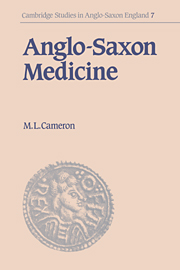Book contents
- Frontmatter
- Contents
- Preface
- Acknowledgements
- List of abbreviations
- 1 Introduction
- 2 Conditions for health and disease
- 3 Physician and patient
- 4 The earliest notices of Anglo-Saxon medical practice
- 5 Medical texts of the Anglo-Saxons
- 6 Compilations in Old English
- 7 Compilations in Latin
- 8 Latin works translated into Old English: Herbarium and Peri Didaxeon
- 9 Sources for Old English texts
- 10 Making a Leechbook
- 11 Materia medica
- 12 Rational medicine
- 13 Magical medicine
- 14 The humours and bloodletting
- 15 Surgery
- 16 Gynaecology and obstetrics
- 17 Conclusions
- Appendix 1 Quotations for ch. 10
- Appendix 2 Quotations for ch. 13
- Appendix 3 Quotations for ch. 14
- Appendix 4 Quotation for ch. 15
- Bibliography
- Index
5 - Medical texts of the Anglo-Saxons
Published online by Cambridge University Press: 30 September 2009
- Frontmatter
- Contents
- Preface
- Acknowledgements
- List of abbreviations
- 1 Introduction
- 2 Conditions for health and disease
- 3 Physician and patient
- 4 The earliest notices of Anglo-Saxon medical practice
- 5 Medical texts of the Anglo-Saxons
- 6 Compilations in Old English
- 7 Compilations in Latin
- 8 Latin works translated into Old English: Herbarium and Peri Didaxeon
- 9 Sources for Old English texts
- 10 Making a Leechbook
- 11 Materia medica
- 12 Rational medicine
- 13 Magical medicine
- 14 The humours and bloodletting
- 15 Surgery
- 16 Gynaecology and obstetrics
- 17 Conclusions
- Appendix 1 Quotations for ch. 10
- Appendix 2 Quotations for ch. 13
- Appendix 3 Quotations for ch. 14
- Appendix 4 Quotation for ch. 15
- Bibliography
- Index
Summary
Of the surviving medical texts demonstrably compiled by Anglo-Saxons in Old English and in Latin, the Old English ones are on the whole earlier and more voluminous than those in Latin, and for the most part are more useful for an understanding of Anglo-Saxon medical practices and beliefs. Because they are in English, we cannot suppose that they are mere ‘mindless’ copies of Latin sources; rather, they must have been processed through the minds of their translators and compilers, and so should give us a clearer insight into the workings of the English minds that put them together. However, Latin texts assembled by English workers are also of value for our understanding of their medicine. Almost all of those in Old English were collected by Oswald Cockayne in his Leechdoms, Wortcunning and Starcraft of Early England, published in three volumes in the Rolls Series between 1864 and 1866. The industry and learning of this remarkable man are truly amazing and everything done since in the field of Anglo-Saxon medicine has been done in the shadow of Cockayne's achievement.
The oldest surviving book of medicine in Old English is a beautifully made manuscript, now London, BL, Royal 12. D. xvii. It appears to have been written about 950 at Winchester and to be a copy of a lost exemplar which may have been composed about fifty years earlier in the last years of the reign of Alfred the Great. It is tempting to suppose it to be a product of the literary efforts of Alfred's court, but we have not enough information to do other than guess.
- Type
- Chapter
- Information
- Anglo-Saxon Medicine , pp. 30 - 34Publisher: Cambridge University PressPrint publication year: 1993

